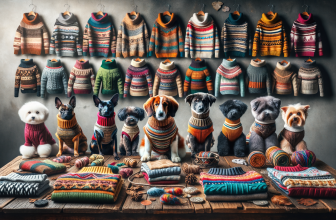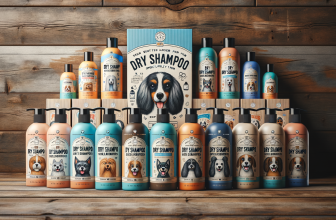
Looking to help your furry companion gain a healthy amount of weight? Whether they’re recovering from an illness, underweight, or you’re prepping your pup for a dog show, finding the right dog food for weight gain is crucial. It’s not just about piling on the pounds; it’s about ensuring those pounds come from muscle and not just fat. With an overwhelming number of products on the market claiming to be the best, how do you decide which dog food will effectively and safely help your dog reach their ideal weight?
Our Top Picks
Our #1 Top Pick: Bully Max High Performance Super Premium Dog Food
If you’re looking for a high-calorie dog food that packs a punch in nutrition, Bully Max High Performance Dog Food could be your go-to choice. It’s a meat-based formula with a high protein content (30%) and a significant 20% fat content, making it incredibly energy-dense. This food is perfect for all breeds and doesn’t contain any corn, wheat, or soy, which are commonly associated with canine allergies. Furthermore, the kibble is fortified with vitamins and minerals, supporting overall health while aiding weight gain.
Pick #2: Purina Pro Plan Sport, Energy & Vitality Support
Purina Pro Plan Sport is designed for active dogs, but its nutrient-rich formulation makes it excellent for weight gain. It features 30% protein and 20% fat, promoting muscle conditioning. Real chicken is the first ingredient, which is both palatable and a high-quality source of protein. It also includes amino acids that are essential for muscle development. This diet is also bolstered with antioxidants for a healthy immune system and omega-3 fatty acids for joint health and mobility.
Pick #3: MVP K9 Formula Mass Weight Gainer for Dogs
MVP K9 Formula Mass Weight Gainer is a supplement that can be added to your dog’s current food to help them gain extra weight. This powder is packed with 50% fat and 28% protein and is extremely palatable, encouraging even the pickiest eaters to chow down. A standout feature is that this gainer can be used to supplement your dog’s diet without changing their regular food, which is particularly useful if your dog is settled on a food that they like and does well on.
Pick #4: Earthborn Holistic Grain-Free Dry Dog Food
This grain-free option by Earthborn Holistic is an excellent choice for dogs who may be sensitive to grains. It features a rich mix of proteins, including chicken meal and whitefish meal, which supports muscle building. It has lower fat content compared to some other options in this list, but it’s still quite high in calories, providing the necessary energy for weight gain. Moreover, the blend of fruits and vegetables ensures your dog gets a variety of nutrients and antioxidants.
Pick #5: CRAVE Grain Free High Protein Adult Dry Dog Food
CRAVE Dog Food offers a grain-free, high-protein diet which closely matches the ancestral diet of dogs. It boasts a 34% protein content with real meat as the first ingredient, catering to a dog’s natural preference. While it’s not specifically designed for weight gain, its high-calorie and nutrient-dense profile provides enough energy for your dog to bulk up, especially when coupled with suitable exercise.
What to Know Before You Buy
- Correct Diagnosis: Ensure your dog actually needs to gain weight by consulting with a vet. Weight gain should be a planned and controlled process.
- Whole Food Ingredients: High-quality dog food has whole food ingredients like real meat, vegetables, and fruits at the top of the ingredient list.
- Meal Frequency: Increasing meal frequency rather than portion size can aid in healthy weight gain.
- Switch Slowly: When changing your dog’s diet, gradually introduce the new food to prevent digestive upset.
- Exercise: An appropriate balance of exercise helps with building muscle and not just fat.
Factors to Consider Before Buying
- Individual Needs: Dogs have unique dietary needs based on breed, age, and health conditions. Tailor your choice to your specific dog.
- Protein Content: Helps with muscle development. Look for a protein content of around 30%.
- Caloric Density: High-calorie foods provide the extra energy needed for weight gain.
- Fat Content: Fat is an energy-dense nutrient and important for gaining weight, but the balance is key to ensure it’s healthy weight.
- No Fillers: Avoid foods with unnecessary fillers like corn, soy, and wheat that don’t provide substantial nutrition.
- Palatability: The food needs to be tasty for your dog to willingly eat more.
Why Trust ChooseRight?
At ChooseRight, we take product reviewing seriously. We’ve scoured through thousands of reviews, engaged with pet health professionals, and analyzed nutritional content with a fine-tooth comb. Only after such rigorous scrutiny do we compile our list of recommendations so that you can choose with confidence.
Finishing Thoughts
Finding the best dog food for weight gain doesn’t have to be a hassle. You now have a curated list of the top products that offer a blend of high-quality ingredients, caloric density, and the essential nutrients to help your dog grow stronger and healthier. Remember to always make dietary changes under the guidance of your vet and consider your dog’s individual needs to ensure a safe and effective weight gain journey. With the right food, a little patience, and lots of love, you’ll have a robust and happy pup in no time.
Frequently Asked Questions
What factors should I consider when choosing dog food for weight gain?
When selecting a dog food for weight gain, consider the calorie density of the food, the quality of the ingredients, including the protein content, and whether the food meets your dog’s dietary requirements. It’s also important to ensure the food is appetizing to encourage eating and is appropriate for your dog’s size, age, and any health conditions.
How can I safely increase my dog’s weight?
To safely increase your dog’s weight, you should provide controlled portions of high-calorie, nutritious food spread out over multiple smaller meals a day. Combine this with regular check-ups at the vet to ensure the weight gain is healthy. Additionally, moderate exercise can help build muscle mass rather than just fat.
Are grain-free diets better for a dog’s weight gain?
Grain-free diets are not necessarily better for weight gain. The most important aspect is the overall caloric content and nutritional balance of the food. Some dogs may require grain-free options due to allergies or sensitivities, but otherwise, grains can be a healthy part of a dog’s diet.
Can I just feed my dog more of their regular food to help them gain weight?
Simply feeding your dog more of their regular food might lead to weight gain, but it is not always the most effective or healthiest approach. Weight gain foods are specifically formulated with higher protein and calorie content which is often required to help a dog gain weight in a balanced manner.
How much food should I feed my dog to promote weight gain?
The amount of food necessary for weight gain will vary depending on your dog’s metabolism, current weight, target weight, and the specific calorie content of the food. It’s best to work with a veterinarian to determine the right portion size for your dog’s needs.
Are there any supplements I can add to my dog’s diet to help with weight gain?
There are various dietary supplements designed to promote weight gain that can be added to your dog’s diet, such as high-calorie gels or powders that can supplement their meals. However, it’s essential to consult with your vet before adding any supplements to ensure they are safe and effective for your dog’s specific situation.
How quickly should I expect my dog to gain weight?
Healthy weight gain takes time and should be a gradual process. Rapid weight gain can be unhealthy. Most dogs should aim to gain no more than 1-2% of their body weight per week, but this can vary based on individual circumstances. Continuous monitoring and adjustments to their diet may be necessary.
Is it safe to change my dog’s food to one that’s designed for weight gain?
Changing your dog’s food is generally safe, but it should be done gradually to avoid gastrointestinal upset. Start by mixing the new food with the old in increasing amounts over the course of a week or two. Always monitor your dog for any adverse reactions during the transition.
What if my dog isn’t gaining weight despite feeding them high-calorie food?
If your dog isn’t gaining weight despite being on a high-calorie diet, consult your veterinarian. They may have an underlying health issue that needs to be addressed, or they may require adjustments to their diet or feeding strategy.
Can obesity be a concern when trying to increase my dog’s weight?
Yes, overfeeding for weight gain can lead to obesity, which comes with its own health risks. It’s important to aim for a healthy weight and body condition, and not just an increase in pounds. Regularly assess your dog’s body condition score and adjust their food intake as needed.







